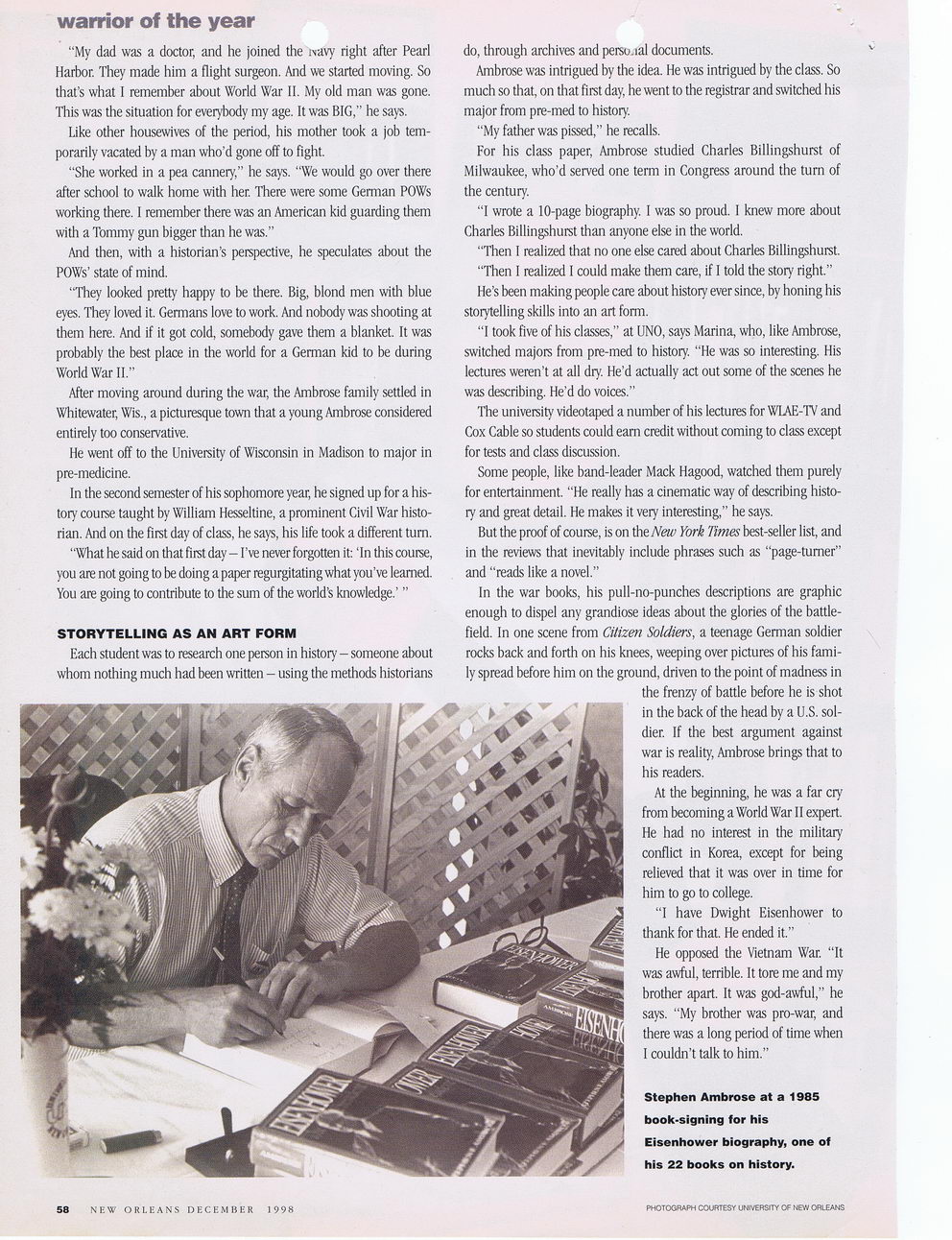This text was obtained via automated optical character recognition.
It has not been edited and may therefore contain several errors.
warrior of the year ?My dad was a doctor, and he joined the wavy right after Pearl Harbor. They made him a flight surgeon. And we started moving. So that?s what I remember about World War II. My old man was gone. This was the situation for everybody my age. It was BIG,? he says. Like other housewives of the period, his mother took a job temporarily vacated by a man who?d gone off to fight. ?She worked in a pea cannery,? he says. ?We would go over there after school to walk home with her. There were some German POWs working there. I remember there was an American kid guarding them with a Tommy gun bigger than he was.? And then, with a historian?s perspective, he speculates about the POWs? state of mind. ?They looked pretty happy to be there. Big, blond men with blue eyes. They loved it. Germans love to work. And nobody was shooting at them here. And if it got cold, somebody gave them a blanket. It was probably the best place in the world for a German kid to be during World War II.? After moving around during the war, the Ambrose family settled in Whitewater, Wis., a picturesque town that a young Ambrose considered entirely too conservative. He went off to the University of Wisconsin in Madison to major in pre-medicine. In the second semester of his sophomore year, he signed up for a history course taught by William Hesseltine, a prominent Civil War historian. And on the first day of class, he says, his life took a different turn. ?What he said on that first day - I?ve never forgotten it: ?In this course, you are not going to be doing a paper regurgitating what you?ve learned. You are going to contribute to the sum of the world?s knowledge.? ? STORYTELLING AS AN ART FORM Each student was to research one person in history - someone about whom nothing much had been written - using the methods historians do, through archives and personal documents. Ambrose was intrigued by the idea. He was intrigued by the class. So much so that, on that first day, he went to the registrar and switched his major from pre-med to history. ?My father was pissed,? he recalls. For his class paper, Ambrose studied Charles Billingshurst of Milwaukee, who?d served one term in Congress around the turn of the century. ?I wrote a 10-page biography. I was so proud. I knew more about Charles Billingshurst than anyone else in the world. ?Then I realized that no one else cared about Charles Billingshurst. ?Then I realized I could make them care, if I told the story right.? He?s been making people care about history ever since, by honing his storytelling skills into an art form. ?I took five of his classes,? at UNO, says Marina, who, like Ambrose, switched majors from pre-med to history. ?He was so interesting. His lectures weren?t at all dry. He?d actually act out some of the scenes he was describing. He?d do voices.? The university videotaped a number of his lectures for WLAE-TV and Cox Cable so students could earn credit without coming to class except for tests and class discussion. Some people, like band-leader Mack Hagood, watched them purely for entertainment. ?He really has a cinematic way of describing history and great detail. He makes it very interesting,? he says. But the proof of course, is on the New York Times best-seller list, and in the reviews that inevitably include phrases such as ?page-turner? and ?reads like a novel.? In the war books, his pull-no-punches descriptions are graphic enough to dispel any grandiose ideas about the glories of the battlefield. In one scene from Citizen Soldiers, a teenage German soldier rocks back and forth on his knees, weeping over pictures of his family spread before him on the ground, driven to the point of madness in the frenzy of battle before he is shot in the back of the head by a U.S. soldier. If the best argument against war is reality, Ambrose brings that to his readers. At the beginning, he was a far cry from becoming a World War II expert. He had no interest in the military conflict in Korea, except for being relieved that it was over in time for him to go to college. ?I have Dwight Eisenhower to thank for that. He ended it.? He opposed the Vietnam War. ?It was awful, terrible. It tore me and my brother apart. It was god-awful,? he says. ?My brother was pro-war, and there was a long period of time when I couldn?t talk to him.? Stephen Ambrose at a 1985 book-signing for his Eisenhower biography, one of his 22 books on history. 58 NEW ORLEANS DECEMBER 1998 PHOTOGRAPH COURTESY UNIVERSITY OF NEW ORLEANS

Ambrose, Stephen New-Orleans-Magazine-page-58